macphail, meighen, and more: the 1921 canadian federal election
Agnes Macphail, September 12, 1926. City of Toronto Archives, Globe and Mail fonds, Fonds 1266, Item 8807.
I wrote about this campaign and its impact for TVO a few years ago, but never got around to writing a "bonus features" post like I usually do when I've gathered plenty of interesting material. The centennial of the election feels like the right time to haul research discoveries out of their slumber on my computer.
Toronto Star, October 7, 1921.
A cringey-from-modern-perspective profile of Macphail.
Flesherton Advance, December 1, 1921.
The Durham Review provided extensive coverage of a late November Grey Southeast all-candidates meeting in Durham, where a crowd of up to 1,500 people favoured Macphail. Incumbent Conservative MP Robert James Ball, who had sat in Parliament since 1911, believed that political restlessness was due to people being too well off and tried to use the Bible to back up this claim. He depicted Meighen as a "able, young, courageous" leader, while Mackenzie King was too wobbly on economic policy. When he attacked Progressive leader Thomas Crerar for policy that would reverse the march of progress, someone in the audience yelled "no fear of it." Liberal candidate Walter Hastie claimed he didn't need half-an-hour to talk, only to exceed his time limit by rambling on about railway policy.
Then it was Macphail's turn.
Durham Review, November 24, 1921.
The Flesherton Advance would get carried away with its commentary on the Grey Southeast results:
It was an Aggienizing defeat for the two old line candidates in South Grey.The lady wears skirts, but they do not appear to be much of an impediement when she takes a notion to run.There will be four parties in the next House -- Liberal, Conservative, Progressive, and a Female Party.
Evening Telegram, December 3, 1921.
The Meighen campaign, perhaps sensing its unpopularity, went on a advertising blitz, with tons of newspaper ads and, in friendly publications, plenty of advertorials outlining why the Conservatives should be returned to power.
Hamilton Herald, November 26, 1921.
Hamilton Herald, November 29, 1921.
Flesherton Advance, December 1, 1921.
Samples of the Conservatives' attempts to reach out to female voters. The London Free Press reported that on election morning two women in Brantford got into a hair-pulling fight over their political opinions at the corner of Alfred and Colborne Streets. "The battle was waging furiously when two men stepped out of a nearby drug store and separated the parties concerned, starting a disarmament conference a la Washington, all their own.
Leamington Post, December 1, 1921.
No group was too small for a Conservative appeal. This pitch to tobacco farmers in Essex County failed, as Conservative candidate Eugene Scratch finished dead last in Essex South.
Ottawa Journal, December 5, 1921.
By the end of the campaign, the ads were short and direct. The plea failed, as Canadians decided they really didn't need Meighen, consigning his party to third place.
Stratford Daily Herald, December 3, 1921.
Among the unsuccessful attempts to knock down Mackenzie King was criticizing his behaviour during the First World War. Conservative outlets and friendly veterans organizations attacked King for his support of Wilfrid Laurier's anti-conscription stance and sticking by the Liberals instead of joining the Unionists. They attacked him for sitting out the war by working for the Rockefeller Foundation on what became his book Industry and Humanity. The veterans publication Khaki Call complained, in all capital letters, that "although a comparatively young man and in good health, he gave no service any kind to the country, which he now aspires to be head of during the days of reconstruction." The Liberals were criticized for advertising in the German-language press across the country, which was presented as a slap against those who fought against Germany.
Evening Telegram, December 5, 1921. The figure in the middle is Toronto Star publisher Joseph Atkinson.
Conservative papers repeatedly told their readers that as good soldiers they had to do their duty and vote for the people who had sent them over to Europe in the first place, not Mackenzie King, whom the Toronto Evening Telegram portrayed as "the arch-enemy of the soldiers' cause." These messages that might have alienated those suffering from PTSD or remembered the divisions the Conscription Crisis created. As the Canadian Forum observed, "it was as citizens that our men went to war, and it seems they wish to vote as citizens."
Hamilton Herald, December 5, 1921. Click on image for larger version.
C.F.T. Woodley, running with the support of labour organizations, the Progressives, and the United Farmers of Ontario, finished a close second to Conservative incumbent Gordon Wilson in Wentworth, losing by 129 votes.
Profiling the party leaders, Maclean's writer "Scrutator" had these thoughts on Mackenzie King:
His intellect is bold, rather than subtle, masculine rather than meticulous. His eyes range over great horizons and see the landscape in the large. His weapon is not the rapier, but the hammer of Thor. He is elemental and not 'precious.' If Mr. King had not been a politician he would have made a great revivalist. His qualities as a statesman have yet to be proved; his friends do not seriously doubt them. But his qualities as a preacher are indisputable. He is, before all else, the gospeller of political righteousness. His appeal is always to the national conscience. In all of his orations there is the unmistakable smack of the pulpit.
On Progressive leader Thomas Crerar:
A plain, unvarnished man, large of frame and soft of voice, hesitating in opinion, honest and unimaginative, loyal in friendship, fond of fun and devilment, but with a deep religious strain -- such is Mr. T.A. Crerar, who guides the Agrarian storm. It is these homely qualities that make Mr. Crerar so pleasant a figure to dwell upon. In politics, as in other spheres, character is of more consequence than intellect. And it is, unhappily, more rare.
Ottawa Journal, December 3, 1921.
In Ottawa, voters could receive results over a pleasant dinner at the Chateau Laurier.
The Globe, December 7, 1921.
A brief, fawning bio of King published by the Globe the day after his victory. Their editorial saw plenty to be optimistic about in the final results:
This is no ordinary party victory. It is a popular uprising against autocracy. It is all the more significant because the popular forces were divided, so that the full force of public opinion against the Government is not indicated by the composition of the new House, and can only be measured by the popular vote. The combined Liberal, Progressive, and Independent vote is enormously in excess of that cast for the Government candidates. It is a magnificent display of the free working of democratic institutions; it creates inspiring opportunities for public service, and our hope is that the service will be worthy of the inspiration and the opportunity.
The Globe's adoration would fade, as King failed to implement demands from the paper's prudish owner, William Gladstone Jaffray, including passing bills banning the publication of horseracing results.
The Canadian Forum felt hope for the future. "The man who can restore and foster a spirit of unity between city and country, between Ontario and Quebec on the one hand and Ontario and the West on the other hand, is a man of destiny.”
The Globe, December 10, 1921.
Some editorials from the Conservative side:
The Hamilton Herald partly blamed the defeat on the lingering stench of conscription at the end of the First World War, specifically Quebec voters in general and farmers throughout the rest of the country who were still pissed off over their sons being drafted after being assured they wouldn't be. "Added to this were the widespread discontent and restlessness caused by industrial depression, business stagnation and unemployment, and the class movement of the organized farmers. The best government in the world could not have survive the conditions under which Mr. Meighen appealed to the country.
The Ottawa Journal believed Canadians would quickly regret their vote, feeling the public had handed control of the country to Quebec, which the Liberals won in a landslide. "However, it is now the duty of all Canadians to accept loyally the verdict registered in the ballot boxes, and to be willing and ready to give fair play to whatever may come politically in accordance with the constitution -- to endeavour, no matter what the party predilictions of any of us may be, to give a fair field to the new order of things called for by virtue of the vote of a majority of the people."
The Stratford Daily Herald couldn't comprehend the results. "Canada needs Meighen and Canada will yet hear more of him. It is unbelievable that he should have no place in the counsels of his country. His campaigning revealed him to the people as a constructive statesman, a man richly endowed with these qualities of which our public life stands in sore need."
The Evening Telegram summed up their vitriolic feelings about the results by declaring that King's win was "Canada's disgrace and not the Conservative party's responsibility." Who was to blame? "The foreign vote and the French Canadian have taken charge of Canada," editor "Black Jack" Robinson wrote. "Anglo-Saxon Ontario had to learn a lesson. That lesson has been well taught."
Ouch.
Ouch.
***
Further listening: the Champlain Society's Witness to Yesterday podcast on the 1921 election.

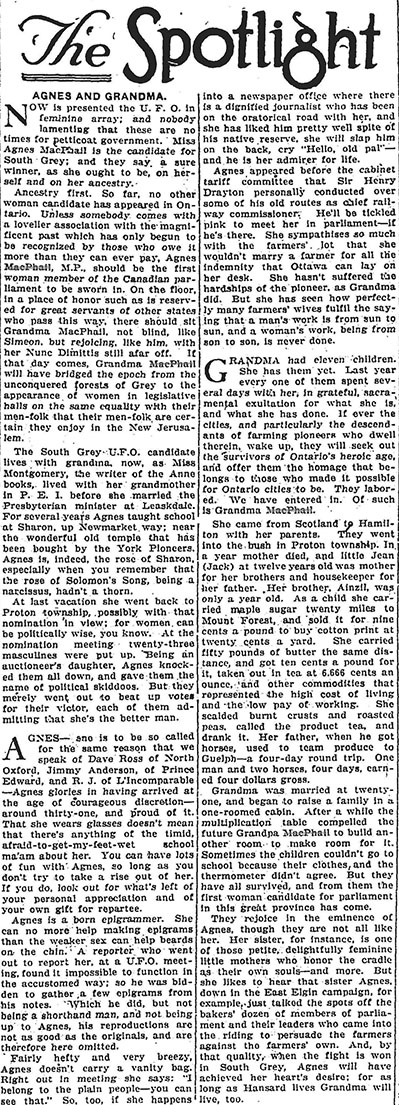


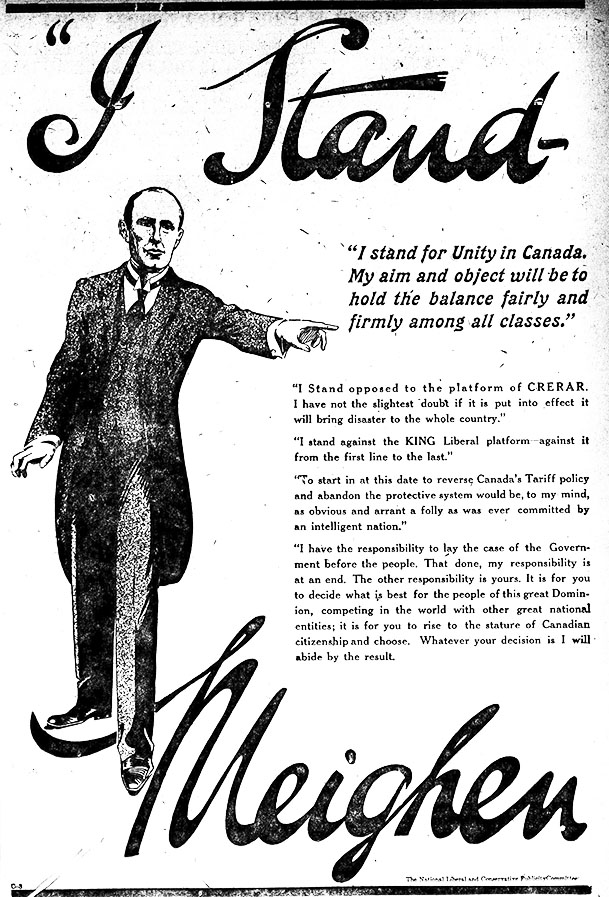
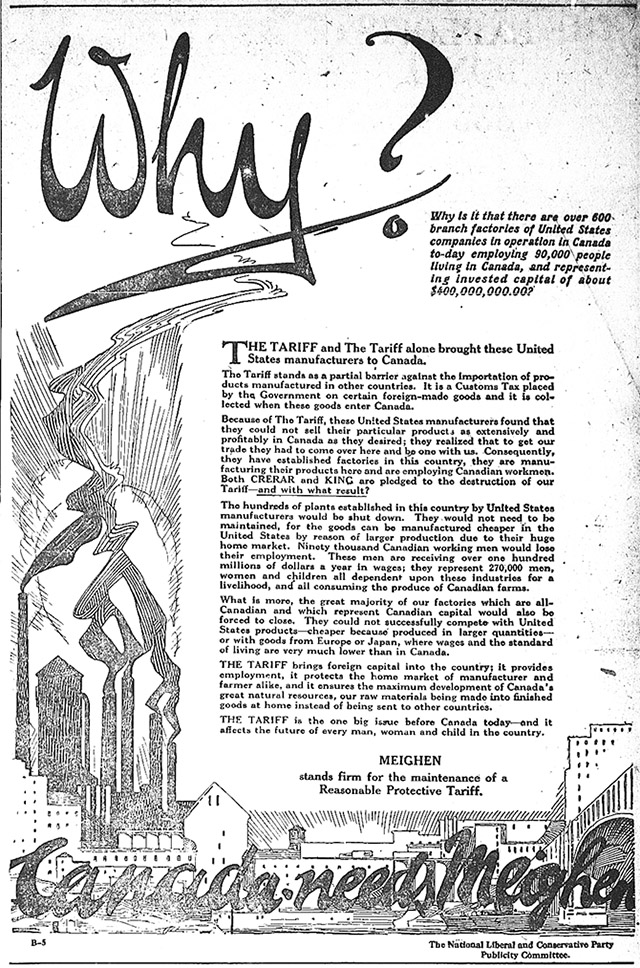
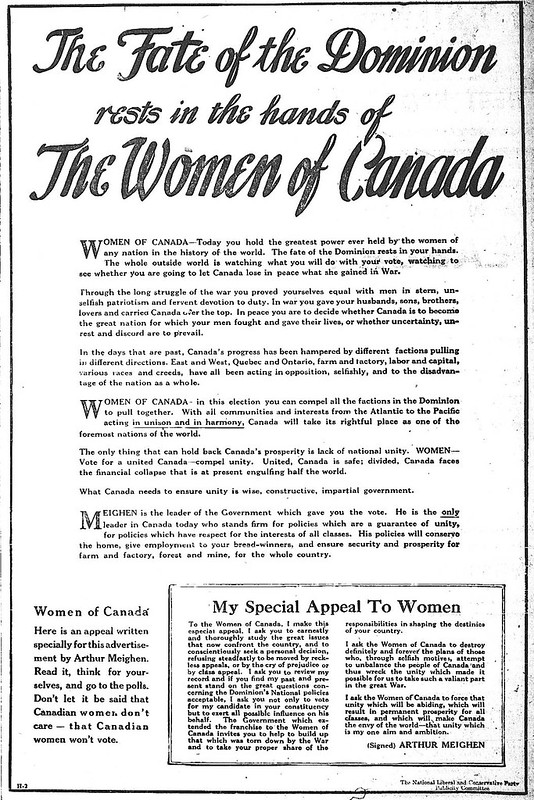

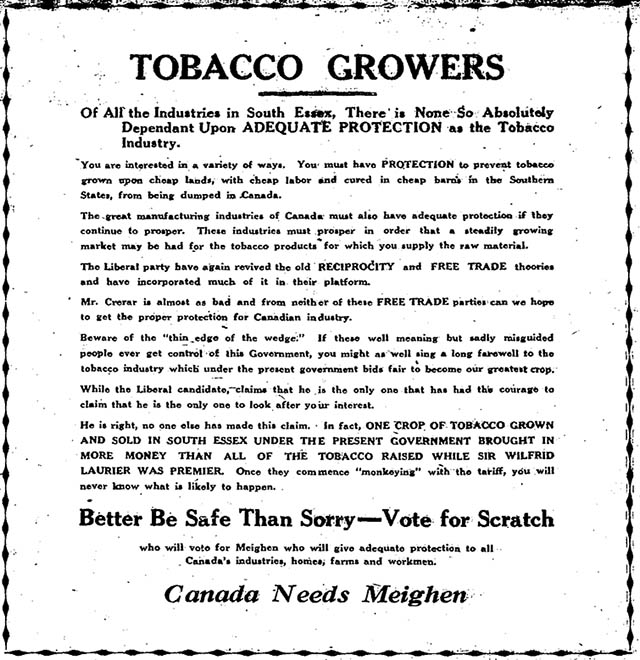

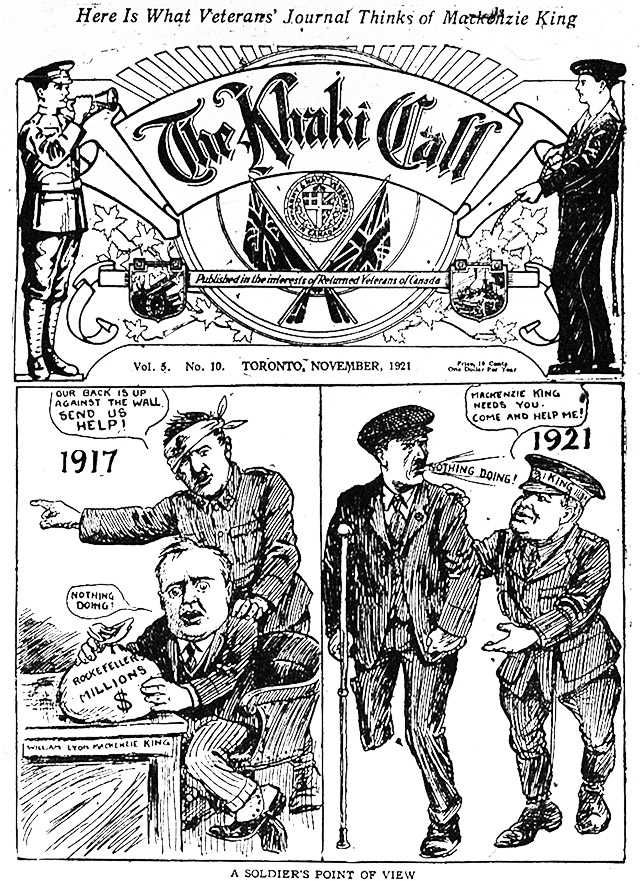

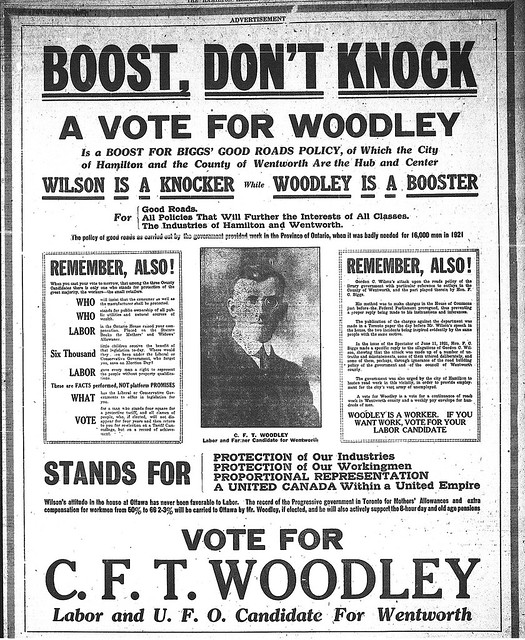




Comments